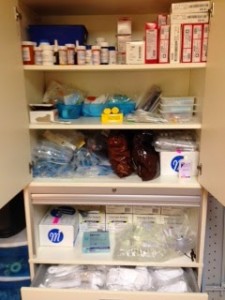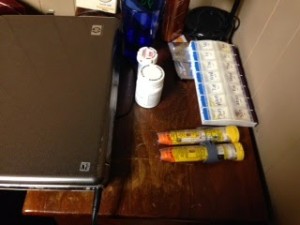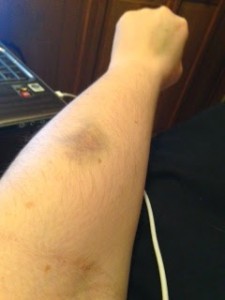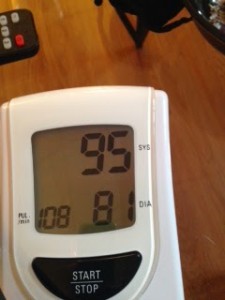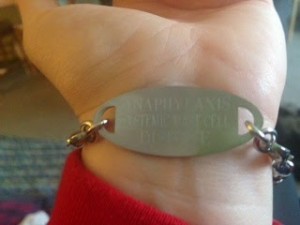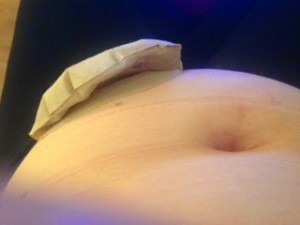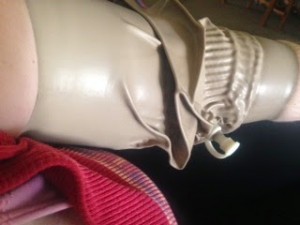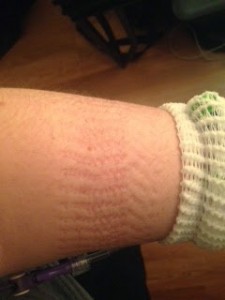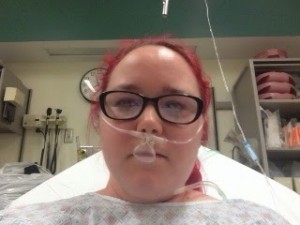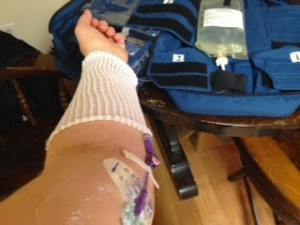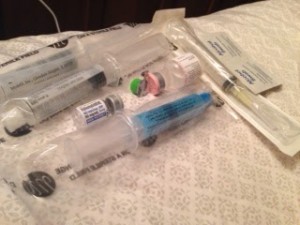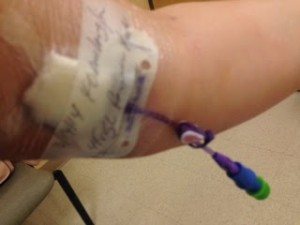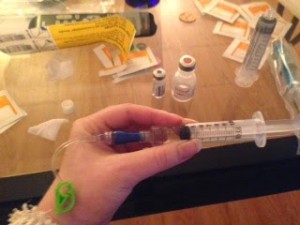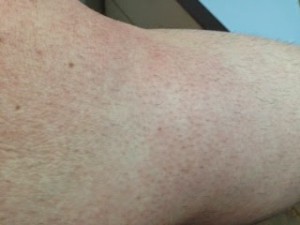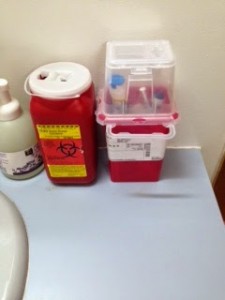Roller coaster
I got my first central line in February 2014. At that point I was at the hospital two or three times a week. Being able to manage my needs at home as much as possible was a welcome relief and so I welcomed the line.
I had a PICC line placed in my left arm about three inches above the elbow. The poor PA who placed it was terrified. She called me the day before to go over the procedure in pinched, staccato notes. She casually mentioned that she was considering doing the placement in the ER since they would have a crash cart nearby. The infusion nurses had regaled her with stories of my reactions and anaphylaxis history. I laughed and then felt bad about it. “Whatever you need to feel comfortable is fine,” I told her. It is the first time I remember a provider being scared of my disease.
The second time I remember a provider being scared of my disease was the following day when a home infusion nurse came to change my dressing. She was much more frightened than the PA had been. She made me hold my epipen while she did the dressing change. “You’re doing fine,” I reassured her, hoping that was true. Comforting trained professionals while they treat me is a special sort of pain, like pulling out a thorn. It shouldn’t have happened in the first place and half the pain is disbelief and feeling ridiculous.
That PICC saw a lot of action. But before I was a mast cell patient, I was an infectious diseases microbiologist, and I wanted that PICC line out. PICC lines are basically a straight shot to infections. I managed to keep my line sterile and my site immaculate and lobbied hard for a port to be placed. In September 2014, the PICC was removed from my arm and a port was placed in my chest.
I wanted a port for a few reasons, but the big reason was because I could manage it completely independently. I expend a lot of energy trying to stay infection free and a big part of that is staying out of the hospital. The PICC line allowed me to give myself meds and fluids but I needed someone else to change the dressing and it was harder to troubleshoot outside of a hospital. With a port, I could access and deaccess the line, change the dressing, and give meds on my own. That meant I only needed to have supplies and myself, and I could bring those just about anywhere. I could also shower more easily, take a real bath, and go swimming with the port. It was an all around win.
In the three years and three weeks that I had it, that port lived quite a life. I took it to my parents’ house and on long walks with my dogs. I took it to work on countless days. I took it to the beach and water parks. I took it to my pool on hot summer evenings. I took it to the hospital for appointments and surgeries and procedures. I took it to my niece’s First Communion. I took it wedding dress shopping with my sister. I took it on many long weekends in New Hampshire. I took it apple picking and trick or treating. I took it Christmas shopping. I took it to my girls’ weekend in Maine. I took it to the Garden of the Gods in Colorado Springs. I took it to California. I took it to Disney World. I took it all over Florida. I took it to the blue waters of Tulum and underground rivers and the Mayan Ruins at Coba. I took it on the Star Ferry and on long walks around Hong Kong. I took it to the Forbidden City and the Great Wall of China.
It wasn’t completely without issues. I had some trouble with my port and a line infection abroad is on my top ten list of things I never want to experience. But the horrors my mind produced in response to my fear never materialized. I am fortunate to be able to say that my panic attacks have been the scariest things I have experienced with a central line.
My port was my security blanket. It still is. I could travel to all these places because I wasn’t terrified of anaphylaxis. I still took extreme measures to prevent anaphylaxis but I wasn’t paralyzed in fear by the thought of traveling. I had the meds and IV access and could keep myself stable. In an emergency, I could get myself to a decent hospital, and from there, I could get home.
I started having trouble with my port in May. My port had a small reservoir and was difficult to access unless you always put the needle through my skin in the same spot. After years of having a needle continuously penetrating the skin in the exact same spot, scar tissue formed around this spot and the site became indurated. Eventually, the skin at that site became ulcerated and millimeters thin. It was almost to the point that you could see the port through the hole. I developed a literal hole in my chest over my port.
I had a huge amount of anxiety over it. My port allowed me to control so many things about my life and I was really scared about losing that control. I spent a few months trying to get the hole to heal. It did not heal. It ulcerated and got larger.
I had the port replaced at the end of September. They were able to put the new port in the same pocket as the old one with the new line ending in the same blood vessel. They did a fantastic job on the ulcer repair and removed some additional dead tissue. All in all, it went as well possible.
It is staggering to think about how much has changed between the placement of my first central line and my most recent one. It never occurred to me that I would need a permanent central line. I figured I would have it to for a few months and I would get better and it would be removed. It obviously didn’t play out like that.
There have been some very low points. I decompensated a lot. I ended up needing more GI surgery. I transitioned to doing IV meds daily. I needed continuous IV fluids for a while. I’ve had a bunch of procedures, scopes, etc. I lost the ability to eat all solids. I needed several months of medical leave from work.
I’ve had plenty of high points, too. And in the past year, I’ve had a lot of them. Most things considered, I have steadily improved since the spring of this year. I am back to work. I am actively working on MastAttack again. I have been able to adjust my meds a lot as some symptoms have improved. I can eat again, and not just eat, but eat real food. It still takes a lot of work to keep this body functioning but it’s not as much of a constant struggle.
I no longer feel like I’m constantly flirting with anaphylaxis. I haven’t used an epipen in several months. It’s a reality for me that I will never be free of the risk of anaphylaxis. I still keep epipens out in every space in my home. I still carry around four epipens and IV rescue meds at all times. But I’m not waiting for it anymore. I’m not always afraid. That in itself has been unbelievably liberating.
I am working on decreasing my IV meds and IV fluids very, very slowly. My long term goal is to get to a place where I do IV fluids overnight three nights a week and only access as needed for IV rescue meds or procedures. It will likely take years to get to this point, even if I continue to improve. It has been hard because these things have kept me safe for a long time. I think I will never be free of them entirely and that’s okay.
But my relationship with my port is changing. I am very slowly trying to transition to a person who uses my line but who is not completely dependent upon it for safely. Part of this is training my body. Part of this is training my mind to stop catastrophizing and to let go of my anxiety. It’s not obvious yet which part which be the hardest.
I get Xolair every four weeks at my immunologist’s office at the hospital. Last week, his nurse and I were chatting about my recent port placement and decreasing my IV meds. I shared that the idea of not having a continuously accessed port and therefore ready IV access was scary. “Imagine that,” she said as she gave me my injections. “Imagine just accessing a few nights a week. Imagine if you could have it removed!”
I can’t though. I can’t imagine it. I think I will always have a port and will always need some IV support. But the idea that I could only need it to be accessed for three nights a week is mind blowing. A year ago I was passing out if I stood up, my stomach was newly paralyzed, and I couldn’t eat at all. Now I’m back to work full time, working on the courses for MastAttack U, planning international travel for next year and eating chicken pot pies for dinner. Bananas.
As I get more comfortable with this process, the fear is still fresh, but there is now an edge of exhilaration. Like an amazing ride from a high height. A long drop with a safe landing.
A roller coaster.


